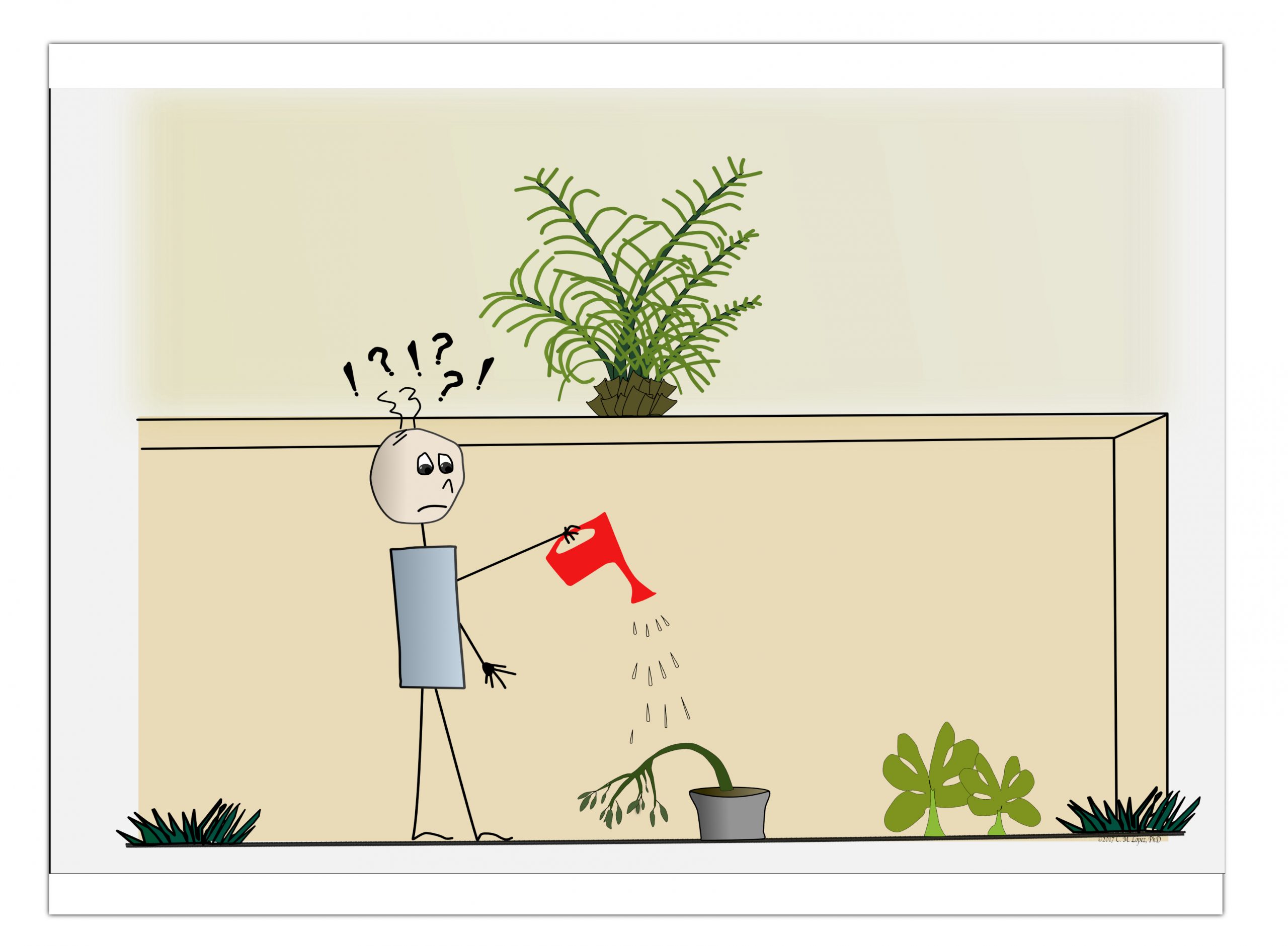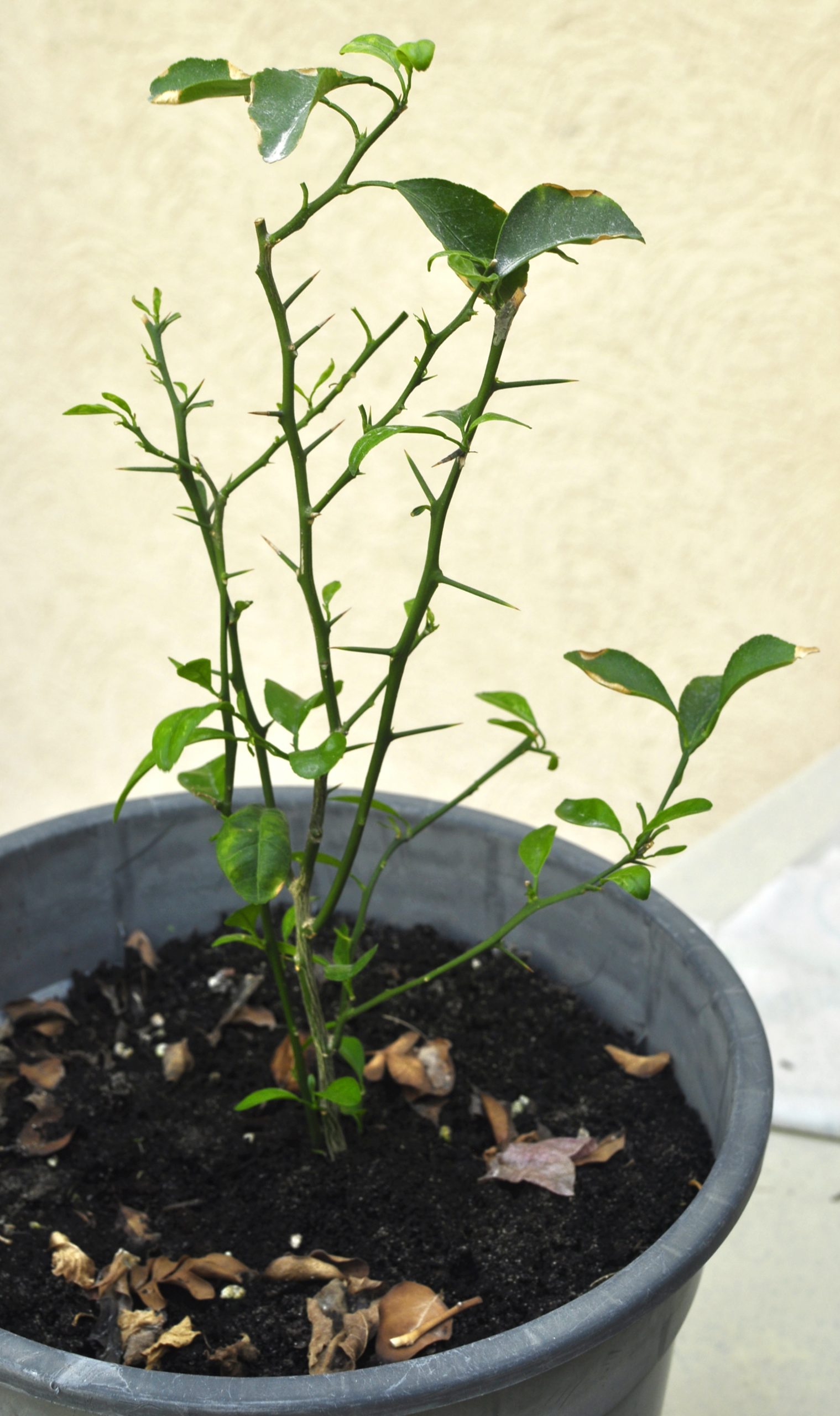
El Palito de Limón (A Tiny Lemon Tree)

In this post:
A tiny story about a relentless survivor. With a little help from an unlikely friend, a small lemon tree embodies the definition of resilience.
Sitting in our garden like the survivor of an unknown cataclysm, el palito de limón barely clings to life. Under the desert’s sun it holds its little-tree secrets tight, unable or unwilling to share them with us.

El palito was one of the potted plants that my awesome husband and I found in this villa when we first moved here. Back then, it was planted in the same plastic container in which I eventually repotted it, its soil, a thin beige sand that it shared with some wild grasses as rachitic and dusty as itself. That was in the spring, which in this country is just like a hot tropical summer in a sandy beach—it sounds wonderful but believe me, the humidity makes it not so much. Anyway, this little tree sat in the garden not growing but not dying until the end of the spring, when the tempetatures outside began to climb. Then it took a turn for the worst and we forgot about it. A few weeks later I was surprised to see it green, somewhat holding on to life despite the baking-oven atmosphere, emitting a citrusy scent every time I tried to pull off one of its brown leaves. I decided to take better care of it. However, nothing seemed to work. It stayed the way it was, looking more dead than alive, faded and exhausted regardless of how much or how little water and care I gave it. At some point I wondered if it would not be better to pull it out and reuse the pot for some other plant that might have a brighter future. I couldn’t make up my mind.
This year Ramandan arrived at the end of May. During the days of fasting, mandatory working times were shorter, there was voluntary hunger and thirst during the scorching daytime hours, feasting and gathering until late at night, waking before sunrise to eat again. Not for us foreigners, though; we hid in our offices with doors closed to eat and drink water. The worst part were the dare-devil drivers of this country, that got even more hurried and aggressive behind the wheel. I was tempted to carry a sing with “Ramadan Mubarak!” written in Arabic to flash to every driver that risked his and our lives on the road. I did not, of course, and we managed to survive anyway—I do not know if staying at home most of the time was a factor.
Around that time, the GCC neighbors decided to get together to bully our host country by blocking all maritimes and air routes coming into Qatar—Ramadan Mubarak!—For about two days the supermarkets ran out of sugar, meat, bottled water, and milk products. If there was hysteria or crisis, I am not sure, I did not see any, but as I said, we mostly kept to ourselves. The only hysterical people I saw were myself and AwHus, when we went to the supermarket and bought the last two remaining cases of a ridiculously expensive bottled water. By the end of the week everything was back to normal; later on Turkish troops arrived in Doha and flights were being diverted on longer routes over Iran, which also sent us food. We were safe.—Onion! Can you imagine having to thank Erdogan and Rouhani for not being invaded or starving to death? It is the strangest of feelings.
The summer marched on, which is to say, days became longer and more tiresome. Every morning the sun came out earlier an earlier, until sunrise started as early as four. The evenings, however, gained only a little over an extra hour of light, none of it useful, since the parks and shallow beaches became sand ovens or gigantic sweltering baths. By summer’s peak, the temperatures often reached between 105-115 °F in the middle of the day. At night the temperatures came down to the upper nineties, with 100% humidity, making the air outside heavy with stagnant dust and moisture. El palito kept going on its slow agony; I wondered if it was having as much trouble breathing outside as us. It never occurred to me to bring it indoors.
As everything kept slowing down, days became faded beige pictures sliding indifferently one after the other. The call to prayers propagated, heavier than usual, through the powdery air. Dust got everywhere, a thin, gritty enemy that you did not see coming until you were covered on it. Sticky too, it tinged the sky a sandy yellow, stuck to leaves and bark, and made cars and windows endlessly dirty.
When the end of July rolled around, AwHus and I put the little tree under the shadow of a bougainvillea and left to spend the rest of the summer in Europe. When we came back nothing much had changed.
Last week I fed el palito for the last time; it has been braver than a plant has a right to be but the desert has been stronger. The little tree must join the pile of random dry sticks in the garden. We will never know who planted it, that was never meant to be known; we will never know if it was really a young lemon tree or something else altogether.
I walk outside, pruning shears in hand; the garden is long but narrow and a few steps cover the distance. I kneel down and reach for the topmost branch; just below the tip, shiny tiny new leaves tremble, still wet from the water sprinkler’s spray.
Afterword: The crisis in the golf region has many different interesting angles. I found the following article unusual and in tune with what we have learned while living here. Probably, it is just one of many aspects, but it makes for an interesting read.
Did you like this post?
Then you will probably like: